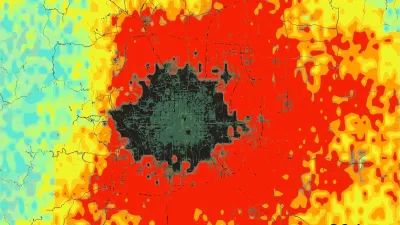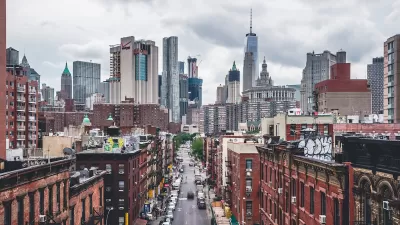Policies that encourage density as a way to reduce carbon emissions won't be able to play a significant role in reducing carbon emissions in time to counteract global warming, according to a new report from the National Academy of Sciences.
The change brought on by rapid densification, urbanization and abandonment of sprawl development patterns by 2050 would not be enough to counteract climate change brought on by carbon dioxide emissions, according to the report.
"Urban planners hoping to help mitigate CO2 emissions by increasing housing density would do better to focus on fuel-efficiency improvements to vehicles, investments in renewable energy, and cap and trade legislation now being voted on in Congress, according to the study, released Tuesday. It concludes that increasing population density in metropolitan areas would yield insignificant CO2 reductions.
Even if 75 percent of all new and replacement housing in America were built at twice the density of current new developments, and those living in the newly constructed housing drove 25 percent less as a result, CO2 emissions from personal travel would decline nationwide by only 8 to 11 percent by 2050, according to the study. If just 25 percent of housing units were developed at such densities and residents drove only 12 percent less as a result, CO2 emissions would be reduced by less than 2 percent by 2050."
FULL STORY: Forget Curbing Suburban Sprawl

Alabama: Trump Terminates Settlements for Black Communities Harmed By Raw Sewage
Trump deemed the landmark civil rights agreement “illegal DEI and environmental justice policy.”

Study: Maui’s Plan to Convert Vacation Rentals to Long-Term Housing Could Cause Nearly $1 Billion Economic Loss
The plan would reduce visitor accommodation by 25% resulting in 1,900 jobs lost.

Planetizen Federal Action Tracker
A weekly monitor of how Trump’s orders and actions are impacting planners and planning in America.

Wind Energy on the Rise Despite Federal Policy Reversal
The Trump administration is revoking federal support for renewable energy, but demand for new projects continues unabated.

Passengers Flock to Caltrain After Electrification
The new electric trains are running faster and more reliably, leading to strong ridership growth on the Bay Area rail system.

Texas Churches Rally Behind ‘Yes in God’s Back Yard’ Legislation
Religious leaders want the state to reduce zoning regulations to streamline leasing church-owned land to housing developers.
Urban Design for Planners 1: Software Tools
This six-course series explores essential urban design concepts using open source software and equips planners with the tools they need to participate fully in the urban design process.
Planning for Universal Design
Learn the tools for implementing Universal Design in planning regulations.
Caltrans
Smith Gee Studio
Institute for Housing and Urban Development Studies (IHS)
City of Grandview
Harvard GSD Executive Education
Toledo-Lucas County Plan Commissions
Salt Lake City
NYU Wagner Graduate School of Public Service





























